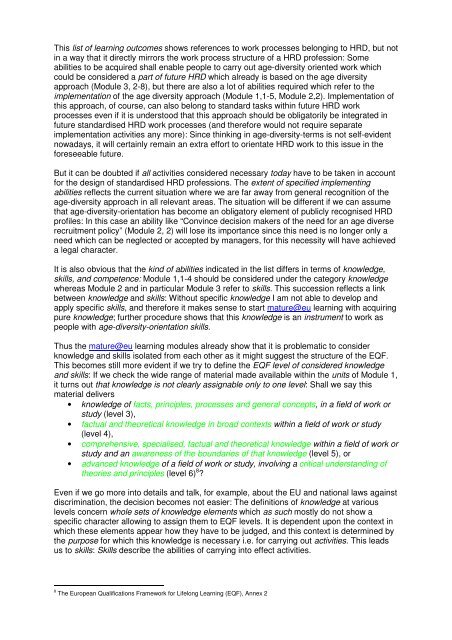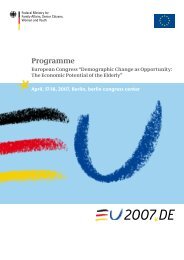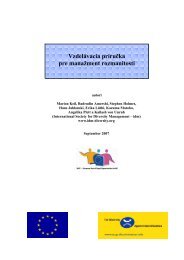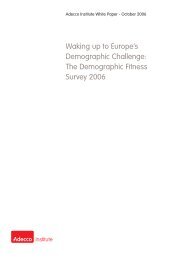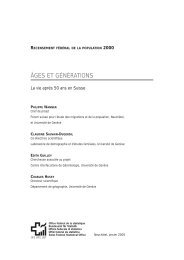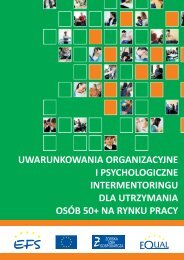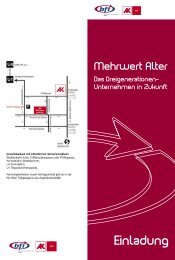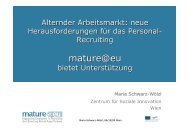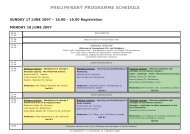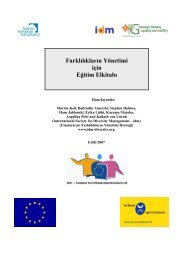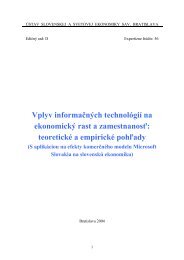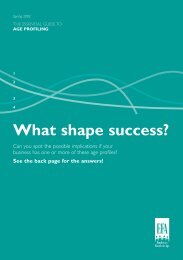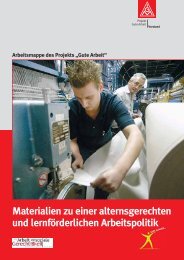EQF Assignment Report.pdf - Mature @ EU
EQF Assignment Report.pdf - Mature @ EU
EQF Assignment Report.pdf - Mature @ EU
Create successful ePaper yourself
Turn your PDF publications into a flip-book with our unique Google optimized e-Paper software.
This list of learning outcomes shows references to work processes belonging to HRD, but notin a way that it directly mirrors the work process structure of a HRD profession: Someabilities to be acquired shall enable people to carry out age-diversity oriented work whichcould be considered a part of future HRD which already is based on the age diversityapproach (Module 3, 2-8), but there are also a lot of abilities required which refer to theimplementation of the age diversity approach (Module 1,1-5, Module 2,2). Implementation ofthis approach, of course, can also belong to standard tasks within future HRD workprocesses even if it is understood that this approach should be obligatorily be integrated infuture standardised HRD work processes (and therefore would not require separateimplementation activities any more): Since thinking in age-diversity-terms is not self-evidentnowadays, it will certainly remain an extra effort to orientate HRD work to this issue in theforeseeable future.But it can be doubted if all activities considered necessary today have to be taken in accountfor the design of standardised HRD professions. The extent of specified implementingabilities reflects the current situation where we are far away from general recognition of theage-diversity approach in all relevant areas. The situation will be different if we can assumethat age-diversity-orientation has become an obligatory element of publicly recognised HRDprofiles: In this case an ability like “Convince decision makers of the need for an age diverserecruitment policy” (Module 2, 2) will lose its importance since this need is no longer only aneed which can be neglected or accepted by managers, for this necessity will have achieveda legal character.It is also obvious that the kind of abilities indicated in the list differs in terms of knowledge,skills, and competence: Module 1,1-4 should be considered under the category knowledgewhereas Module 2 and in particular Module 3 refer to skills. This succession reflects a linkbetween knowledge and skills: Without specific knowledge I am not able to develop andapply specific skills, and therefore it makes sense to start mature@eu learning with acquiringpure knowledge; further procedure shows that this knowledge is an instrument to work aspeople with age-diversity-orientation skills.Thus the mature@eu learning modules already show that it is problematic to considerknowledge and skills isolated from each other as it might suggest the structure of the <strong>EQF</strong>.This becomes still more evident if we try to define the <strong>EQF</strong> level of considered knowledgeand skills: If we check the wide range of material made available within the units of Module 1,it turns out that knowledge is not clearly assignable only to one level: Shall we say thismaterial delivers• knowledge of facts, principles, processes and general concepts, in a field of work orstudy (level 3),• factual and theoretical knowledge in broad contexts within a field of work or study(level 4),• comprehensive, specialised, factual and theoretical knowledge within a field of work orstudy and an awareness of the boundaries of that knowledge (level 5), or• advanced knowledge of a field of work or study, involving a critical understanding oftheories and principles (level 6) 8 ?Even if we go more into details and talk, for example, about the <strong>EU</strong> and national laws againstdiscrimination, the decision becomes not easier: The definitions of knowledge at variouslevels concern whole sets of knowledge elements which as such mostly do not show aspecific character allowing to assign them to <strong>EQF</strong> levels. It is dependent upon the context inwhich these elements appear how they have to be judged, and this context is determined bythe purpose for which this knowledge is necessary i.e. for carrying out activities. This leadsus to skills: Skills describe the abilities of carrying into effect activities.8 The European Qualifications Framework for Lifelong Learning (<strong>EQF</strong>), Annex 2


